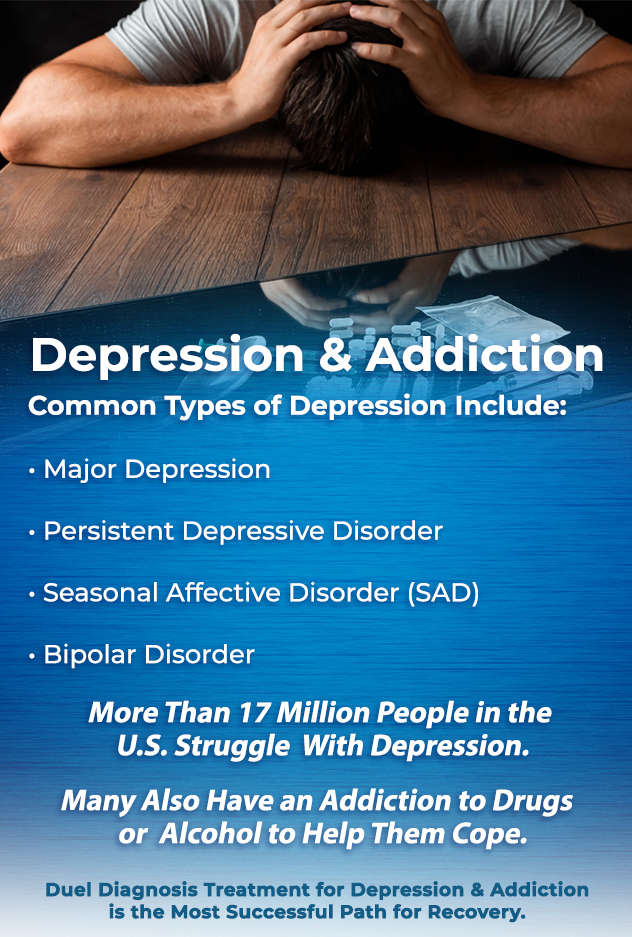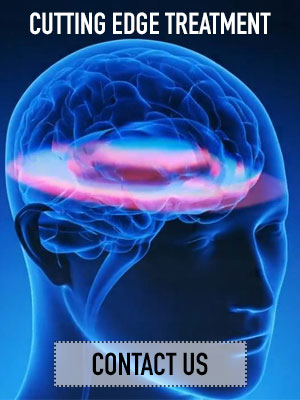
Depression and Addiction
Treatment

Understanding Depression and Addiction: The Challenge of Dual Diagnosis
A dual diagnosis, or co-occurring disorder, is identified when a mental health disorder and a substance abuse disorder occur simultaneously. A common instance of this is an individual suffering from both depression and alcohol addiction. This condition poses unique challenges, especially for current and former professional athletes whose lifestyles can exacerbate or mask the symptoms.
Research indicates that either condition—mental health issues or addiction—can develop first. However, when combined, they tend to worsen and amplify each other’s symptoms, creating a complex cycle that is harder to break. For clients, the pressures of performance and public image can further complicate recovery efforts.
At Pure Recovery, we specialize in treatment for depression and addiction within the athlete community. Understanding the unique dynamics of dual diagnosis treatment, we focus on managing both disorders simultaneously to achieve a balanced and effective recovery.
Co-occurring disorders in athletes require specialized attention because the physical demands and stressors of professional sports can significantly impact the progression and treatment of these conditions. Our tailored approaches aim to address the specifics of substance abuse and mental health issues in tandem, ensuring that recovery strategies are comprehensive and conducive to the athlete’s lifestyle and needs.
If you or someone you know is struggling with depression and addiction, recognizing the signs of these symptoms of co-occurring disorders is the first step towards recovery. Pure Recovery’s programs are designed to help athletes manage their mental health issues while effectively overcoming addiction, fostering resilience and promoting long-term wellness.
Table of Contents
Understanding Depression: More Than Just Sadness
Depression transcends ordinary bouts of sadness, presenting a substantial challenge that is often misunderstood. It is not merely about feeling unhappy or unfulfilled occasionally; depression is a chronic illness that can persist for years if left untreated. This condition varies widely in how it affects individuals: some may manage day-to-day responsibilities despite considerable struggle, while others may face debilitating symptoms, finding themselves isolated and unable to seek necessary help.
At Pure Recovery luxury rehab center, we specialize in an evidence-based, scientific and holistic approach to depression treatment, particularly attuned to the needs of current and former professional athletes. Depression in clients can often be misdiagnosed due to the high-pressure environments in which they operate, making specialized care essential.
Our comprehensive treatment strategy includes 3D brain mapping to precisely assess and address the areas of the brain affected by depression. We combine this advanced technology with one-on-one counseling provided by board-certified professionals, and integrate effective lifestyle changes such as proper nutrition, exercise, and mindfulness training.
These methods are part of our broader commitment to mental health recovery, focusing on helping our clients navigate their way out of depression and back into a life marked by health, happiness, and productivity. Our holistic approach not only treats the symptoms but also addresses the root causes of depression, ensuring a more durable recovery for our clients.
If you or someone you know is struggling with depression, remember that understanding and managing this chronic illness involves recognizing the symptoms, seeking appropriate and personalized treatment, and receiving continuous support, all of which are available at Pure Recovery.
Understanding the Scope of Depression Among Adults
Depression is a widespread condition that affects people from all walks of life, including athletes. The National Institute of Mental Health (NIMH) estimates that in 2017, over 17 million adults in the United States—approximately 7 percent of the population—experienced at least one major depressive episode. Of these, about 11 million suffered from severe impairment due to a major depressive episode.
While public awareness about depression has improved, there remains a significant societal stigma associated with the disorder. Many still wrongly believe that individuals with chronic depression should simply be able to “pick themselves up by the bootstraps.” However, depression is a complex mental health condition that requires proper medical treatment to manage effectively.
Ignoring the symptoms of depression not only worsens the condition but also increases the risk of self-medication with drugs and alcohol. This is particularly concerning for athletes, who may turn to substances as a temporary relief from the pressures and scrutiny of their careers. Without appropriate intervention, this pattern can quickly lead to addiction.
Depression and substance abuse are often linked, as those suffering from untreated depression may find temporary solace in alcohol or drugs, only to find themselves trapped in a cycle of dependency. This highlights the importance of treating depression in the general population with effective, evidence-based approaches.
At Pure Recovery, we focus on overcoming depression through comprehensive care that addresses both the mental and physical aspects of the disorder. Our programs are designed to support individuals in breaking free from the cycle of depression and substance abuse, enabling them to lead healthy, productive lives.
Call Us: (833) 441-0754
Understanding the Different Types of Depression
Depression manifests in various forms, each with distinct symptoms and impacts:

- Major Depression: Often diagnosed when symptoms are persistent daily for at least two weeks, major depression can significantly impair an individual’s ability to function. Clients might find their performance and motivation drastically affected during such episodes.
- Persistent Depressive Disorder: This type of depression might be diagnosed if symptoms persist for two years or longer, albeit with low-grade symptoms that still allow individuals to manage their daily routines. For athletes, this might mean a consistent struggle with mood and energy levels, subtly undermining training and recovery.
- Seasonal Affective Disorder (SAD): Particularly relevant for athletes, SAD commonly occurs during the winter months when daylight is scarce. The lack of light can trigger a depressive state, impacting energy levels and overall well-being, crucial for training regimes.
- Bipolar Disorder, sometimes referred to as manic depression, involves periods of extremely high energy and racing thoughts (mania), followed by episodes of significant sadness and hopelessness. For athletes, these swings can affect everything from physical performance to interpersonal relationships within teams.
Understanding these types of depression and their specific symptoms is essential for effective management and treatment. At Pure Recovery luxury rehab center, we specialize in treating different types of depression, tailoring our approaches to each athlete’s specific condition and lifestyle. This includes everything from medical treatment to psychological support and lifestyle adjustments to ensure optimal mental health and athletic performance.
Identifying the Symptoms of Depression
Depression manifests through various symptoms that can vary significantly from person to person, influenced by factors such as the type of depression, its severity, the duration of untreated illness, and co-occurring issues like substance abuse disorders. For clients, recognizing these symptoms is crucial as they can directly impact mental and physical performance.
Some of the common symptoms of depression include:
- A marked lack of interest in activities or social interactions that were once enjoyable, crucial for team dynamics and personal fulfillment.
- Sleep disturbances, including insomnia, hypersomnia, or constant fatigue, affecting recovery and energy levels crucial for peak athletic performance.
- Noticeable difficulty in concentrating, often seen in reduced performance at work or in sports strategies, alongside an inability to make decisions, even simple ones that could affect gameplay and training.
- Significant changes in appetite and eating patterns, leading to weight loss or gain, which can directly affect an athlete’s physical condition and performance.
- Mood swings that may range from irritability to anxiety and fear, influencing team interactions and personal mental health.
- A deteriorating self-image and poor self-esteem, which are especially detrimental in highly competitive sports environments.
- Persistent feelings of hopelessness and worthlessness, adding emotional weight that can hinder mental resilience and focus.
- Suicidal thoughts or tendencies, an extreme but unfortunately not uncommon symptom that requires immediate attention and intervention.
At Pure Recovery, we understand the unique pressures faced by athletes and the impact of these symptoms on both personal and professional life. Our approach to treating depression in athletes involves a comprehensive strategy that addresses mental health in sports holistically. This includes tailored treatment plans that focus on mental health recovery and strategies for coping with depression in high-stress professions and professional sports, ensuring clients can regain their emotional well-being and continue to perform at their best.
Effective Treatments for Depression
Depression can significantly impact everyone, but there are numerous effective treatments available that can alleviate the symptoms of this illness. Once diagnosed, many individuals start to experience relief from symptoms within just a few weeks, signaling the beginning of recovery.
Treatment options for depressive disorders can include:
- Antidepressant medications that help adjust the brain’s chemical balance.
- One-on-one counseling with licensed, board-certified therapists who understand the pressures athletes face.
- Cognitive Behavioral Therapy (CBT), which is effective in changing negative thought patterns that contribute to depression.
- Meditation training and neurofeedback, non-invasive treatments that help manage stress and improve mental focus.
- TMS Therapy, particularly beneficial for treatment-resistant depression, often used when traditional methods are insufficient.
For clients, combining prescription medication with cognitive therapies is often the most effective form of treatment. However, for those suffering from both depression and an addiction, dual diagnosis treatment is crucial. This ensures that both conditions are addressed simultaneously, significantly improving the chances of a successful recovery and reducing the risk of relapse.
Many treatment centers may not be equipped to offer comprehensive dual diagnosis programs that cater to both mental health and addiction. These co-occurring disorders require a multidisciplinary team approach, involving experts in addiction and mental health.
At Pure Recovery, our clinical team comprises licensed and certified professionals specialized in addiction, psychiatry, clinical psychology, general medicine, and nutrition.
We maintain a high staff-to-client ratio, ensuring that our doctors, therapists, and counselors are available 24/7 to provide the care needed. We recognize that depression and addiction can manifest in various forms, which is why our team customizes each client’s treatment plan according to their specific needs. This tailored approach is especially vital for athletes, whose careers and personal lives can be uniquely affected by these challenges.
To learn more about our specialized Depression and Addiction Treatment located throughout the United States, we encourage you to reach out to us. Our program is specifically tailored to meet the needs of high-stress professions and professional athletes facing the challenges of addiction. Call us toll-free at (833) 441-0754 to speak directly with an addiction specialist who understands the unique pressures and needs of recovery.


